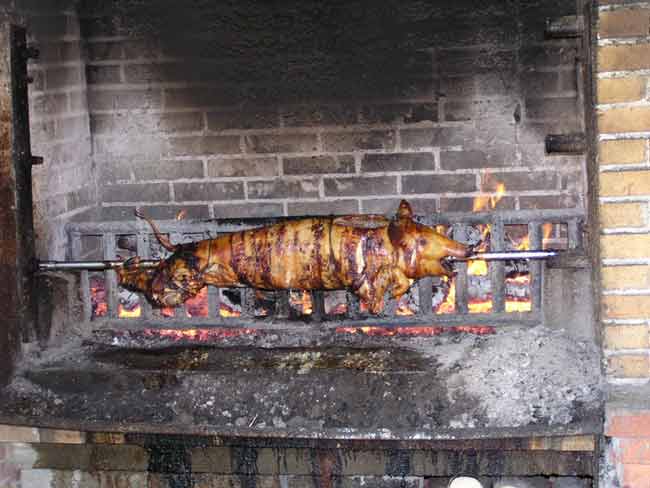Cooking and Cognition: How Humans Got So Smart

Get the world’s most fascinating discoveries delivered straight to your inbox.
You are now subscribed
Your newsletter sign-up was successful
Want to add more newsletters?

Delivered Daily
Daily Newsletter
Sign up for the latest discoveries, groundbreaking research and fascinating breakthroughs that impact you and the wider world direct to your inbox.

Once a week
Life's Little Mysteries
Feed your curiosity with an exclusive mystery every week, solved with science and delivered direct to your inbox before it's seen anywhere else.

Once a week
How It Works
Sign up to our free science & technology newsletter for your weekly fix of fascinating articles, quick quizzes, amazing images, and more

Delivered daily
Space.com Newsletter
Breaking space news, the latest updates on rocket launches, skywatching events and more!

Once a month
Watch This Space
Sign up to our monthly entertainment newsletter to keep up with all our coverage of the latest sci-fi and space movies, tv shows, games and books.

Once a week
Night Sky This Week
Discover this week's must-see night sky events, moon phases, and stunning astrophotos. Sign up for our skywatching newsletter and explore the universe with us!
Join the club
Get full access to premium articles, exclusive features and a growing list of member rewards.
After two tremendous growth spurts — one in size, followed by an even more important one in cognitive ability — the human brain is now a lot like a teenage boy.
It consumes huge amounts of calories, is rather temperamental and, when harnessed just right, exhibits incredible prowess. The brain's roaring metabolism, possibly stimulated by early man's invention of cooking, may be the main factor behind our most critical cognitive leap, new research suggests.
About 2 million years ago, the human brain rapidly increased its mass until it was double the size of other primate brains.
"This happened because we started to eat better food, like eating more meat," said researcher Philipp Khaitovich of the Partner Institute for Computational Biology in Shanghai.
But the increase in size, Khaitovich continued, "did not make humans as smart as they are today."
The early shift
For a long time, we were pretty dumb. Humans did little but make "the same very boring stone tools for almost 2 million years," he said. Then, only about 150,000 years ago, a different type of spurt happened — our big brains suddenly got smart. We started innovating. We tried different materials, such as bone, and invented many new tools, including needles for beadwork. Responding to, presumably, our first abstract thoughts, we started creating art and maybe even religion.
Get the world’s most fascinating discoveries delivered straight to your inbox.
To understand what caused the cognitive spurt, Khaitovich and colleagues examined chemical brain processes known to have changed in the past 200,000 years. Comparing apes and humans, they found the most robust differences were for processes involved in energy metabolism.
The finding suggests that increased access to calories spurred our cognitive advances, said Khaitovich, carefully adding that definitive claims of causation are premature.
The research is detailed in the August 2008 issue of Genome Biology.
The extra calories may not have come from more food, but rather from the emergence of pre-historic "Iron Chefs;" the first hearths also arose about 200,000 years ago.
In most animals, the gut needs a lot of energy to grind out nourishment from food sources. But cooking, by breaking down fibers and making nutrients more readily available, is a way of processing food outside the body. Eating (mostly) cooked meals would have lessened the energy needs of our digestion systems, Khaitovich explained, thereby freeing up calories for our brains.
Instead of growing even larger (which would have made birth even more problematic), the human brain most likely used the additional calories to grease the wheels of its internal functioning.
Digestion question
Today, humans have relatively small digestive systems and burn 20-25 percent of their calories running their brains. For comparison, other vertebrate brains use as little as 2 percent of the animal's caloric intake.
Does this mean renewing our subscriptions to Bon Appetit will make our brains more efficient? No, but we probably should avoid diving into the raw food movement. Devoted followers end up, said Khaitovich, "with very severe health problems."
Scientists wonder if our cognitive spurt happened too fast. Some of our most common mental health problems, ranging from depression and bipolar disorder to autism and schizophrenia, may be by-products of the metabolic changes that happened in an evolutionary "blink of an eye," Khaitovich said.
While other theories for the brain's cognitive spurt have not been ruled out (one involves the introduction of fish to the human diet), the finding sheds light on what made us, as Khaitovich put it, "so strange compared to other animals."
- Are Big Brains Smarter?
- Humans: The Strangest Species
- 10 Things You Didn't Know About You
Robin Nixon is a former staff writer for Live Science. Robin graduated from Columbia University with a BA in Neuroscience and Behavior and pursued a PhD in Neural Science from New York University before shifting gears to travel and write. She worked in Indonesia, Cambodia, Jordan, Iraq and Sudan, for companies doing development work before returning to the U.S. and taking journalism classes at Harvard. She worked as a health and science journalist covering breakthroughs in neuroscience, medicine, and psychology for the lay public, and is the author of "Allergy-Free Kids; The Science-based Approach To Preventing Food Allergies," (Harper Collins, 2017). She will attend the Yale Writer’s Workshop in summer 2023.
 Live Science Plus
Live Science Plus











